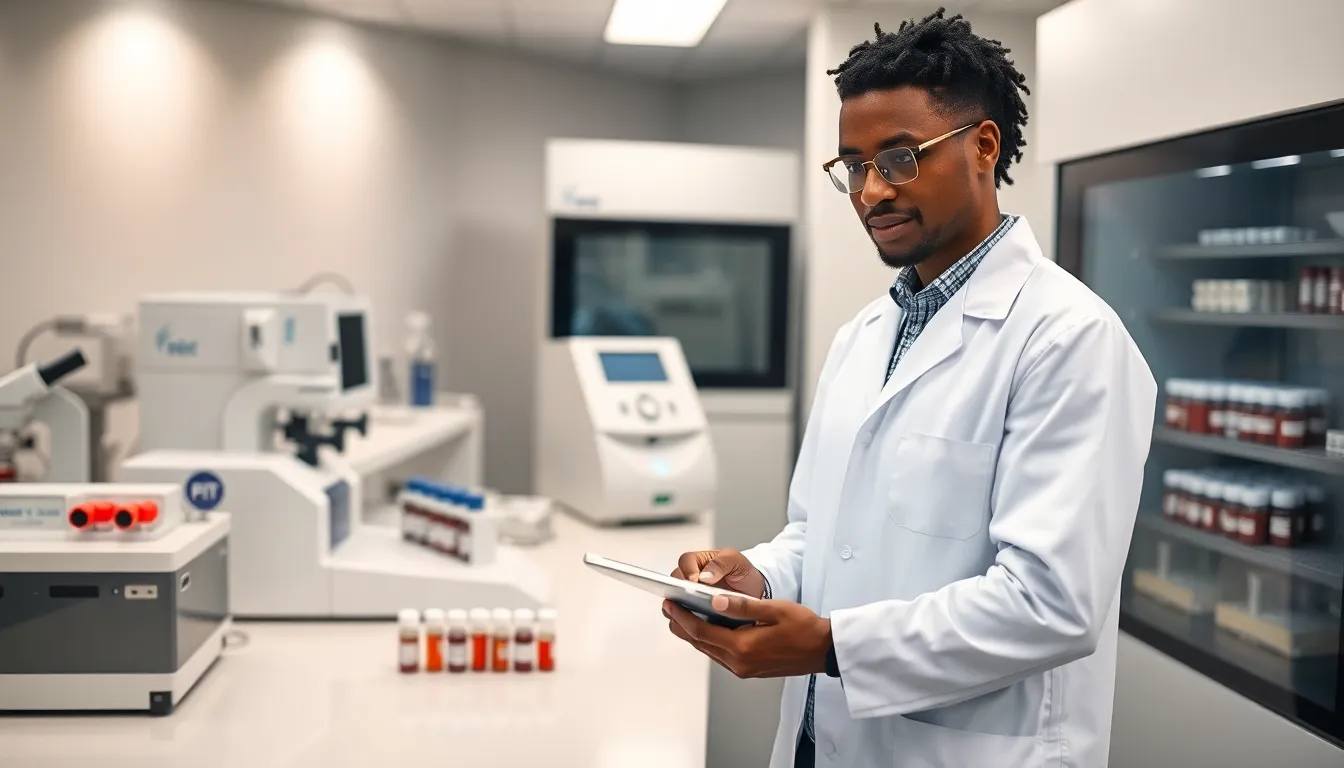Imagine walking into a hospital, and instead of seeing doctors wielding their stethoscopes, you find a confident certified med tech behind the scenes. They’re the unsung heroes of healthcare, making miracles happen with their specialized skills and knowledge. If you’ve ever wondered what a certified med tech does and why this role is crucial, you’re in the right place. In this guide, we’ll dive deep into the world of certified med techs, sprinkling in a dash of humor and a whole lot of valuable information to keep you engaged. So, whether you’re considering a career change or just curious about the med tech field, buckle up.
Table of Contents
ToggleWhat Is a Certified Med Tech?

A certified med tech, or a medical technologist, is a healthcare professional skilled in laboratory science. They perform complex tests on blood, urine, and other bodily fluids. Armed with their tech-savvy brains and laboratory expertise, these individuals ensure that patients receive the right diagnosis and treatment. Picture them in their lab coats, navigating through test tubes and machines like a conductor leads an orchestra. Without these tech-savvy professionals, modern healthcare would be missing a vital piece of the puzzle. In a nutshell, a certified med tech is the backbone of medical diagnostics, making them everything from a wizard in the lab to a vital lifesaver in hospitals.
Importance of Certification in Medical Technology
Certification isn’t just a fancy piece of paper hanging on a wall: it’s the golden ticket that opens doors in the medical field. Being certified as a med tech means you’ve demonstrated your knowledge and skill to an official body. This isn’t just a feel-good fact. Employers actively seek out certified individuals because they can trust that these professionals understand the intricacies of lab operations. Also, certification enhances job security and often leads to better job opportunities, all while boosting one’s confidence levels to new heights. A certified med tech not only stands out but fundamentally contributes to the quality of care patients receive.
Educational Pathways to Becoming a Certified Med Tech
Now, let’s get down to the nitty-gritty: how does one become a certified med tech? The journey usually begins with obtaining a bachelor’s degree in medical technology or a related field. Courses often include microbiology, chemistry, and anatomy, things that sound way cooler than they actually are, especially when you’re knee-deep in a textbook.
After completing the educational requirements, aspiring med techs must pass a certification exam, such as the one offered by the American Society for Clinical Pathology (ASCP). Some even decide to get an associate degree or certificate, which can kick off their careers in less time but may limit their advancement options down the line. Whether through a two-year program or a four-year degree, one thing’s clear: aspiring med techs should be ready to study hard and stay focused. As the incredible Yoda would say, “Do or do not: there is no try.”
Key Responsibilities of a Certified Med Tech
What exactly does a certified med tech do on a day-to-day basis? Well, their responsibilities are as varied as their skill sets. Key tasks include:
- Performing laboratory tests: This involves running complex assays that help identify conditions or monitor health.
- Interpreting test results: Med techs must analyze data and ensure accuracy as they report findings to physicians.
- Maintaining equipment: This responsibility isn’t just about looking good in a lab coat: it requires understanding and caring for laboratory instruments.
- Staying compliant: Remember, regulations are everywhere. Med techs must adhere to safety standards and protocols set by governing bodies.
Plus to these serious duties, certified med techs often collaborate with other healthcare professionals, ensuring an integrated approach to patient care. With so much on their plates, med techs often joke that time in the lab is like a strange mix of a science fair and a rock concert.
Salary and Job Outlook for Certified Med Techs
Now, let’s get down to the numbers. According to the U.S. Bureau of Labor Statistics, the median annual wage for medical and clinical laboratory technologists was around $54,180 as of 2020. The job outlook for certified med techs is bright, with a projected growth rate of approximately 11% from 2020 to 2030. This growth is primarily due to an aging population that requires more medical testing and the ongoing technological advancements in laboratory procedures.
With opportunities available in hospitals, private laboratories, and even research facilities, certified med techs are in demand. High wages, excellent job stability, and fulfilling work made for one amazing career option. What’s not to love? If hoping for a position that also helps people, the med tech field might just be the right path.
Challenges and Rewards of the Profession
Every job comes with its ups and downs, and being a certified med tech is no different. To shine a light on some challenges, the profession can sometimes be stressful. Tight deadlines, the pressure of accuracy, and long hours in a lab setting can take their toll. Also, the complexity of tests often requires continuous learning, which while rewarding, can be daunting.
But let’s not forget the rewards. Making a tangible difference in patients’ lives is undoubtedly the biggest perk. Certified med techs enjoy diverse work environments and often have the flexibility to specialize in areas of their choice. The sense of accomplishment when a test helps shape a patient’s treatment plan is hard to beat. Also, decent salaries paired with job security make this field a fantastic choice.
Continuing Education and Professional Development
For certified med techs, learning doesn’t stop once they secure their certification. In fact, continuous education is a must. Many states require med techs to maintain their credentials through further education or training, making it imperative to stay updated on the latest practices, technologies, and regulations. This could involve attending workshops or enrolling in courses that focus on emerging research in medical tech.
Professional development opportunities abound, allowing certified med techs to specialize further or even branch into management roles. This dedication to lifelong learning not only helps improve the quality of patient care but also enhances career mobility. Eventually, this makes med techs not just workers, but innovators in the healthcare field.

